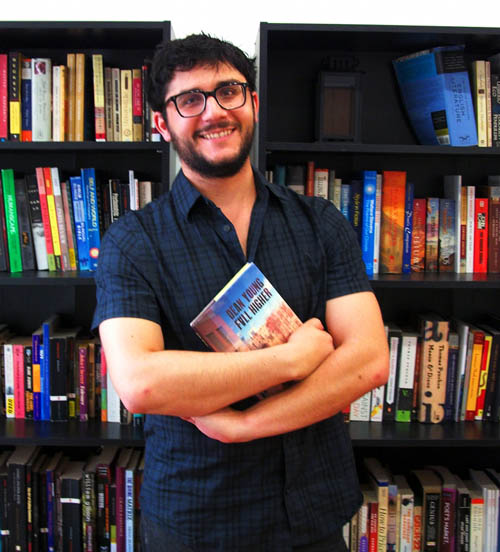
Brian Miles
Tell us a little bit about what you were doing before you came to Columbia.
If an MFA in poetry is going to mean anything to you, you have to be really passionate about the art form. After two years and a half years of focusing on economics I stumbled upon the book Genius by Harold Bloom. The book provides commentary on the work of one hundred literary geniuses and inspired me to throw myself fully into the study of literature. From there I realized my particular affinity for poetry, and two years after graduating with a BA in both economics and English, here I am.
I think two things are important about that background. First, the inspiration came independently and was reinforced through education. I don’t know that you need to have studied a lot of poetry in a university environment to prepare yourself for an MFA, but I think it’s certainly helpful to establish a base before you go out exploring for yourself because it gives you a framework to build on. Two, I took some time off of school before jumping back in. Even that two years of life experience (during which I was still writing and reading as fervently as ever) provided affirmation that this path makes sense for my life and, of course, gave me new skills and wisdom I would never have had going straight through school. I cannot imagine coming out of a graduate program right now. Everyone is different but the time off working in something totally unrelated to academia (marketing in my case) has been so valuable to my development as a person and as a poet. Judging from the people in my class, this is not an unusual story (in fact at 2 years out I’m a bit of a baby).
Why did you choose Columbia for your graduate study?
I grew up in a suburb of Detroit and went to school in Ann Arbor at the University of Michigan. I love Ann Arbor–I think it’s a wonderful college town–but Chicago is one of the great cities in the world and I want to expand my sensibility by living in this environment.
That’s why I chose Chicago. I chose Columbia because the vibe it gives is a great counter-balance to my Big Ten undergraduate experience. It is the opposite of stuffy. Touring the campus I felt the vibe of people doing art I didn’t quite understand, people doing art I am on the edge of “getting,” and then art I really resonate with. I think that is one of the most important things for me: opportunities to expand.
I also really love the faculty. The experience I had between application submission and my choice to come here was filled with people from the program reaching out to me every step of the way. I really admire the work of the faculty; there isn’t one person who I’d have to be polite about if someone asked me what I think of their work. When I came to visit they seemed very available and that was confirmed by the student I spoke with. It’s just a great environment for someone to get a lot out of.
Tell us about a project you’re working on that you’re excited about.
My professional background is in web development and right now I’m working behind the scenes with technology-related elements of Orange Quarterly, an online periodical with plans to launch on Halloween. The site can be found at www.orangequarterly.com.
Beyond that I’m working on my poetry, which will eventually become a collection. That’s a process that happens both organically and through specific craft. I’ve been studying the work of Dean Young recently to try to figure out the rhythms he uses to get to his unique, playful, yet technically accomplished style. I sit down to look at his latest collection, Fall Higher, a couple times a week.
I have also been deepening my interest in Eastern philosophy and practice by starting yoga and continuing my exploration of meditation practices. Lately that has included making my way through the Upanishads. Those ideas make their way into much of my poetry. For me that is the crux of growing as a poet: continue to evolve your inspirational sources while you also work on your technique to turn those inspirations into technically accomplished, beautiful art.
I believe if you don’t enjoy the technical minutiae of any craft, whether it’s poetry, painting, photography, or whatever, you’re never going to really make it to the potential your inspiration allows. I spend my time with my poetry the way I do because I like to, because I get a kick out of trying to figure out why art works, but when I reflect on it I think it’s beneficial.
